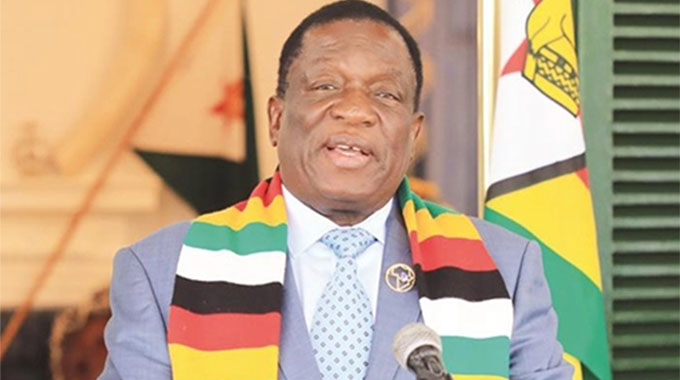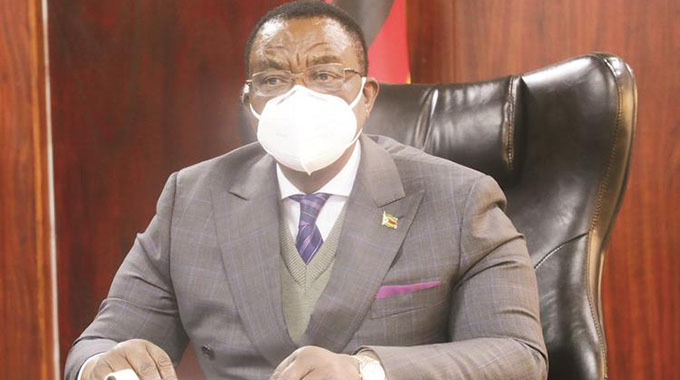Stop ritual killings: President

Fungi Kwaramba
In Gokwe
ZIMBABWEANS led by traditional leaders, as the custodians of the country’s culture, should shun ritual killings and live-in peace, unity and harmony enjoying the rich cultural diversity that the nation offers, President Mnangagwa said.
This comes as the nation has in recent months been witnessing a spike in gruesome murders of children with the murderers wantonly disregarding the sanctity of life. Apart from that cases of kidnapping of children are also on the rise.
However, such practices, the President said, have no place in Zimbabwe, a unitary state that values human life, tolerance, peace and unity which are all cornerstones of national development.
In his address on the occasion of the National Cultural Commemoration Day, that is marked globally on May 21, the President said the values of respect and honour must forever be cherished.
“The values of respect and honour must be promoted while our chiefs and traditional leaders must continue to dissuade our people to shun these so-called ritual practices. The killing of our children is not acceptable,” the President said.
He added that the convergence of people from all walks of life at Chief Njelele homestead is part of the African tradition of approaching life communally and must forever be observed as it defines, not only Zimbabweans but Africans at large.
“I want to express my profound gratitude to Mambo, Chief Njelele for allowing the nation to gather here at his homestead and to share this important day with the great people of this area.
“This tradition of communities visiting one another and celebrating important events is in keeping with our African culture and tradition. As a people, let us never lose our communal approach as we continue to build peace and cohesion among our communities and within the nation,” he said.
This year National Cultural Day commemorations were held at the homestead of Chief Njelele, under the theme “Resilience in safeguarding creativity and diversity,” an apt theme that speaks to the needs to preserve the country’s rich heritage.
The President who was accompanied by Defence Minister Oppah Muchinguri-Kashiri, who is also the ruling party Zanu PF national chairperson, Youth, Sport, Art and Recreation Minister Kirsty Coventry, Environment, Tourism and Hospitality Industry Minister Mangaliso Ndlovu, State Security Minister Owen Ncube, Government and Public Works Minister July Moyo and other senior Government officials, toured colourful exhibitions, where traditional cuisine, medicine, and instruments were on display as Zimbabweans in their diversity showcased their creativity.
The day also saw traditional artistes entertaining the gathering that thronged Chief Njelele homestead to celebrate Zimbabwe’s culture.
“I want to commend stakeholders for the magnificent cultural exhibitions and displays we toured earlier. These demonstrate the universally recognised fact that as African people, we have rich arts, customs and practices. As we have seen today, these are expressed through crafts, clothing, cuisines, music, dance, folklore (ngano), religion and languages,” he said.
But such a history can only be preserved if it is passed from one generation to another because a people without a culture is like a tree without roots, the President added.
“In line with my Governments quest to build strong cultural identity, values and ethics, I challenge families, communities and institutions to diligently nurture a society that recognises our rich cultural heritage while embracing our diversity. These must be passed on from generation to generation.
“As one philosopher once said, ‘a people without the knowledge of their past history. Origin and culture are like a tree without roots.’ While another said, ‘to know your future, you must know your past’.”
The President also saluted First Lady Amai Auxillia Mnangagwa for the role she is playing in coming up with the National Dress Fabric and reviving the Nhanga/Gota/Ixhiba.
“These programmes sustain our social cultural systems, a people premised on the African philosophy of Ubuntu/Hunhu which says, ‘I am, because you are’.
“I exhort families and communities to continue implementing these cultural practices towards protecting the youth from immoral vices and alien values,” he said.
In line with history and cultural preservation, Zimbabwe is in the process of honouring its heroes and heroines
who sacrificed life and limb to defend the country’s traditional values.
“This year’s cultural commemoration entails that we also reflect on our liberation war heritage. The rich heritage interests. Research must consistently enrich studies in heritage, arts and culture with the view of informing the course for a more prosperous future. We can only ignore our history at the detriment of future generations.
“Meanwhile, I commend the youth for their determination, towards developing, publishing and broadcasting our rich liberation war heritage. This will go a long way in enriching the discussions around the country’s liberation heritage from our own.”
The President, who is also the Commander-in Chief of the Defence Forces, commended players in the arts sector for the broadcasting of the story of the iconic national heroine Mbuya Nehanda and the publication of the zography on Comrade Herbert W Chitepo, among other literal and artistic works.
“It is in this vein that on Africa Day, May 25, we will also honour and remember Mbuya Nehanda, who is one of the great authors of our revolution for national independence. I urge the youth, academia and professionals to be actively involved in the ongoing memorialisation of our heritage.
“Projects such as the establishment of the African Liberation War Museum, upgrading of our liberation battle sites, detention and restriction camps must interest our young people.
“These sites include Kamungoma in Masvingo Province, Pupu in Matabeleland North Province and Sikombela here in Gokwe District, among others.”
Meanwhile, the President promised the arts sector, which has not been spared by the crippling effects of the Covid-19 pandemic, that Government recognises the role that culture and heritage can play as a catalyst for sustainable socio-economic development, national, regional and continental integration.
“To this end, the creation of an enabling regulatory and policy framework for the development and growth of the cultural and creative sector is on-going. Cabinet has since approved the enactment of the Arts and Culture Bill which seeks to promote arts and culture as a vehicle for empowerment and employment.”









Comments